i really enjoy these tips.
10 Ways to Deal When Your Child Turns Into a “Monster”
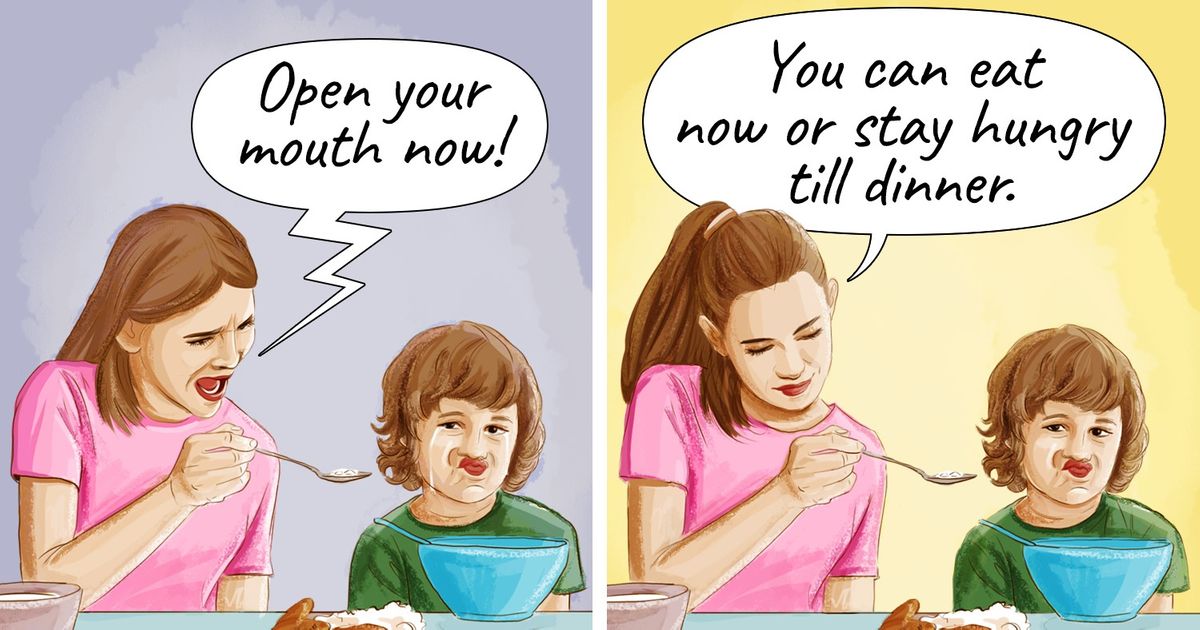
Children are the reflection of their parents, but sometimes it’s hard to believe that we have anything to do with their emotional outbreaks. Recognizing the patterns of a child’s behavior and dealing with them can be quite a task, even for experienced parents. However, facing the problem and fixing it can help build a strong emotional connection between you and the child, and boost their problem-solving skills.
Bright Side understands how challenging and frustrating children’s behavior can be, so we found out what techniques can help you come to terms with even the naughtiest child.
1. Show to your child the connection between their behavior and its consequences.
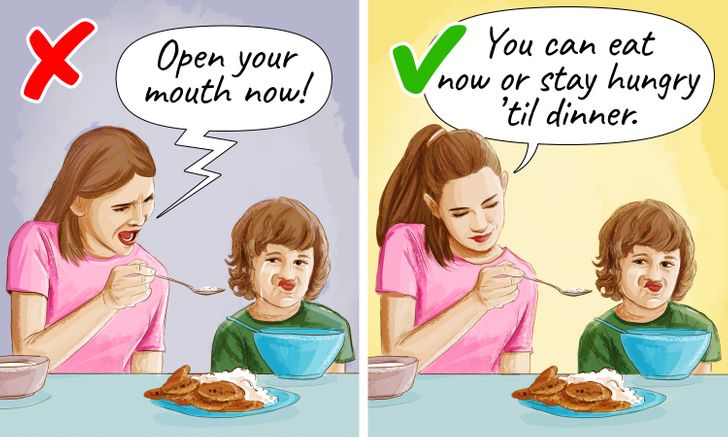
Children have to see the natural consequences of their behavior to realize that they have done something wrong. This technique helps the child understand how the world works and makes them more independent in being able to foresee the consequences of their own actions.
How this works: Parents shouldn’t try to prevent natural things that have been caused by the child’s behavior from happening. However, it doesn’t mean that they should just let it go, especially when the child’s behavior becomes dangerous. Parents shouldn’t try to act like the bad guys or show their superiority to the child. It’s important to be supportive and be ready to deal with the outcome of a child’s behavior.
Examples:
- If the child refuses to eat their lunch, they’ll have to stay hungry until dinner.
- If the child acts like a bully, no one will want to play with them until they apologize.
2. Let your children learn from their mistakes.
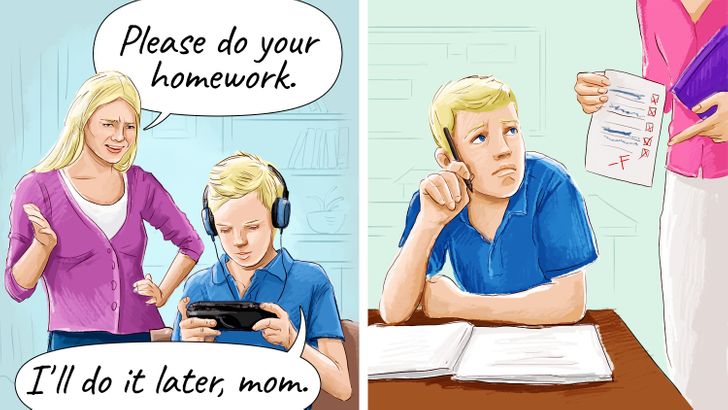
Parents can be overprotective sometimes, so it’s important to teach the child to fix the consequences of their behavior and learn from that experience. Besides, some children may get defensive when their parent starts telling them off, tries to invoke shame, or tries to make the child feel humiliated.
How this works: This technique is a deeper version of the previous one, since it requires the children to be able to fix their mistakes themselves. Parents should help children to process their emotions and give them a hand if it’s needed. But they shouldn’t interfere too much: the aim is to moderate the appropriate response from the child. For example, they can politely ask for help, apologize, etc.
Example: The deadline for the school assignment is supposed to be tomorrow, but the child hasn’t put in enough effort to finish their work on time. Instead of staying up late and helping the child with their homework, their parents should let them get the bad grade and find out how to fix the situation.
3. Find the roots of their bad behavior.
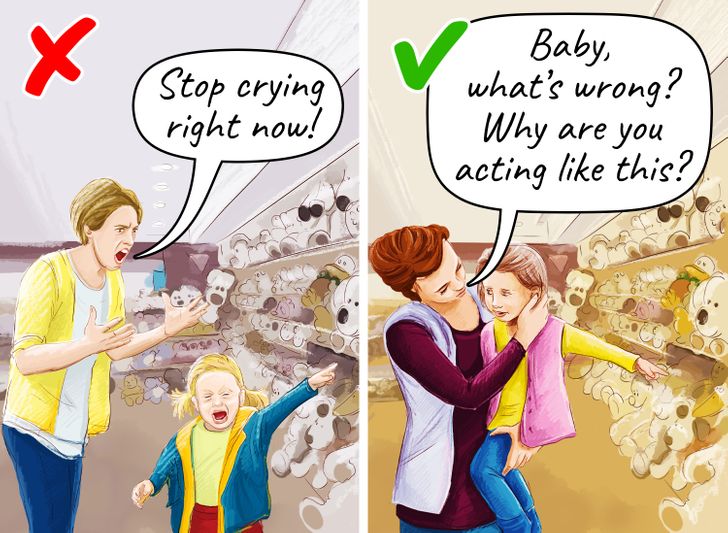
Your child may be throwing a tantrum or acting angry not because of their bad temper, but because they don’t know how to deal with their emotions yet. It’s essential to provide children an opportunity to talk things through and determine the reason for their discomfort.
How this works: When a child starts acting out, remove them from the situation. Find a quiet place where you can talk about their behavior, feelings, and actions. Explain to the child that it’s completely normal to feel different kinds of emotions, but they need to respond to them in an acceptable manner. Show to your child your love and come up with a plan for how you’ll deal with similar emotions in the future.
Example: You go shopping with your child and, at some point, they get frustrated or irritated for no obvious reason. It’s better to walk away from the place and find out what triggered the behavior. The child might be hungry, tired, or just bored but didn’t express their feelings in time.
4. Don’t forget that you’re an adult and don’t indulge in childish behavior.
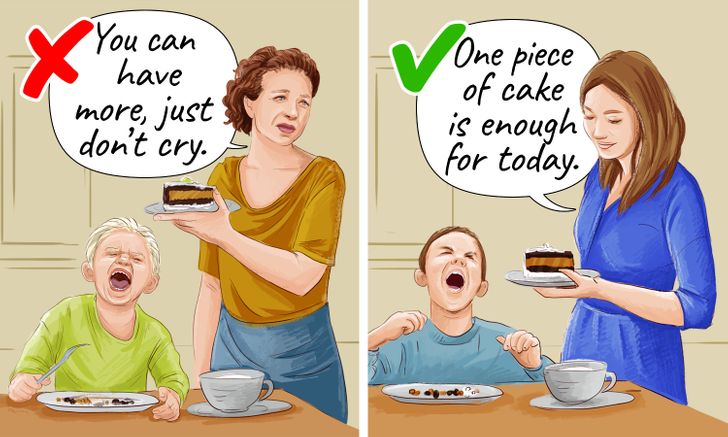
When you talk to your child, concentrate on staying an adult. If parents feel irritated or desperate, this means that they are no longer in the adult position or they don’t have the situation under control. Problems with the child’s behavior can “wake up” our inner child and we start to feel helpless. It makes us make bad decisions and acts inappropriately in a difficult situation.
How this works: If you feel like you start screaming or can’t control yourself in response to the child’s behavior, it’s better to take a break. Leave your child for a couple of minutes (if it’s possible), take a deep breath, and ask yourself whether you’re acting like an adult now. Try to sort out your emotions, cool down, and get back to the conversation.
Example: Your child begs for more sweets, but you know that if they eat too much they’ll become too agitated and will suffer from mood swings. So a parent in an adult position would say: “I’m sorry but I can’t let you eat any more sweets. One piece of cake is enough for the day. Otherwise, you’ll become moody and we want to spend a nice evening together playing board games, right?”
5. Choose the punishment that corresponds to the child’s age.
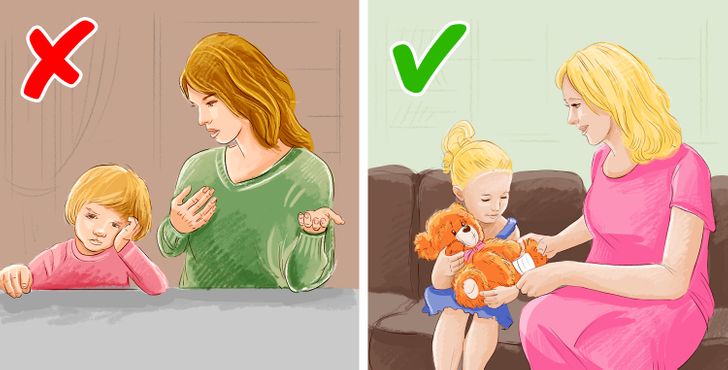
Many parents want their children to act like grown-ups as soon as possible. However, you need to explain things to children on their level in order to make them listen and understand. It’s essential to find the approach that works for the children of your child’s age and modify it as they grow up.
How this works: Keep in mind that your child doesn’t have the experience and the knowledge that you do, so sometimes it can be challenging for them to make logical connections and come to the right conclusions. So the punishment should match the child’s age and their level of development. Overwise, the child won’t understand what they are being punished for.
Example: There’s no use in having an hour-long conversation with a toddler about their emotions and the consequences of their behavior. Children at this age just can’t concentrate for such a long time on one topic.
6. Don’t threaten or scare your child.
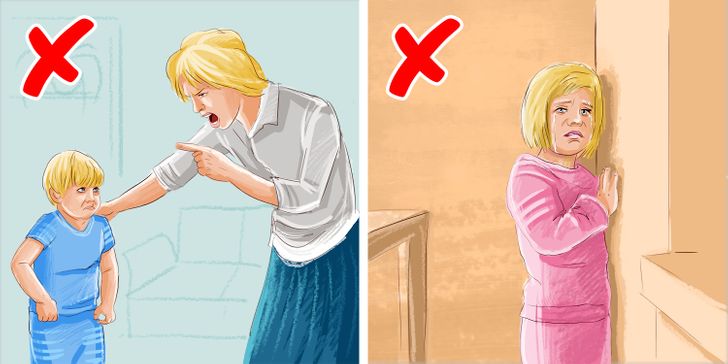
Don’t threaten your child or use corporal punishment. This can negatively influence a child’s development and cause psychological problems in the future. Besides, such behavior damages the emotional connection between the parents and the child and undermines parental authority.
How this works: The use of corporal punishment may have an immediate effect on the child’s behavior, but in the long run, it won’t teach your child how to behave properly. You need to teach your child how to deal with their emotions and show that aggression is unacceptable in any form and definitely can’t be used to resolve conflict.
Example: Your child went to the party without your permission, so you’re going to ground them for 3 months. Instead of applying such harsh measures that will only turn them against you, talk about how much you love them and explain why this behavior is unacceptable. It doesn’t mean that your child can get away with everything, but the severity of the punishment shouldn’t exceed its seriousness.
7. Let your child feel like their opinion matters.
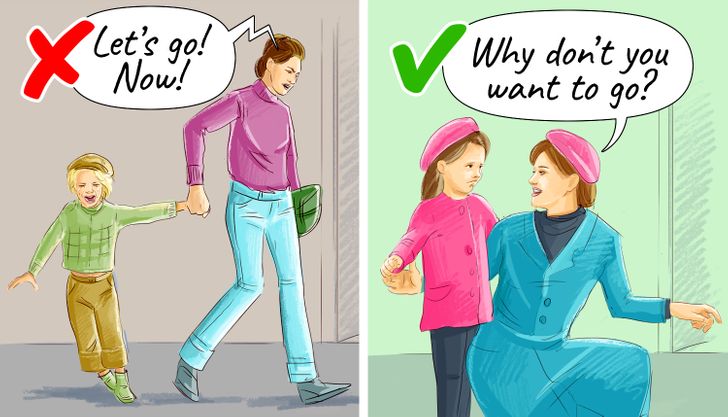
Remember, that no matter how small your child is, they are separate individuals with their own needs, desires, and character. Sometimes children feel too much pressure to act a certain way or to be “perfect,” so they may start acting out to show their independence.
How this works: If you feel like sometimes you can’t come to an agreement about the simplest matters, it’s time to evaluate your child’s contribution to the decision-making process in your family. You don’t have to consider your toddler’s financial advice, but it’d be beneficial if you appreciated their opinion and don’t use the phrase “You can have your own opinion when you’re old enough.”
Example: Your child has a favorite TV show that they never miss, but you were invited to a party together. Your child refuses to go and insists on staying home and watching TV. Instead of diminishing their needs and saying things like “Missing one series won’t matter. You’re going with us.”, find a compromise that meets the needs of every member of your family.
8. Be consistent with your demands and patterns of behavior.
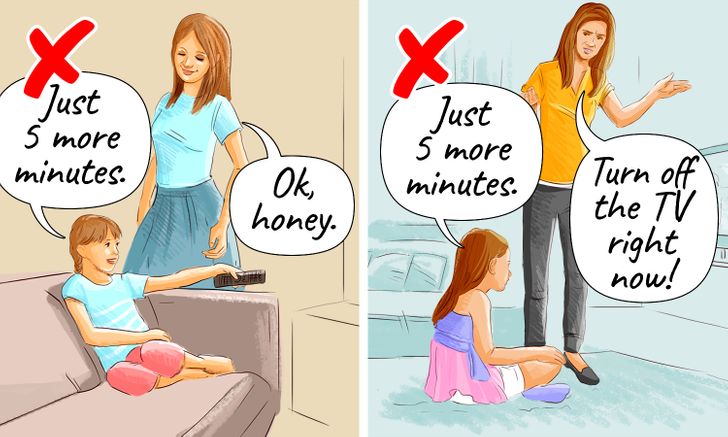
Parents should have a stable approach and views on what’s right and what’s wrong. The child should know the rules and understand which actions are unacceptable regardless of the circumstances. Parents should keep their words and be role models for their children.
How this works: It’s important that the way parents react to the child’s bad behavior doesn’t change depending on different factors. The child should know that they’ll be punished for their unacceptable behavior and it won’t depend on their parent’s mood. Parents should always stick to their promises and not let go of a situation just because they don’t feel like dealing with it at the moment.
Example: The child watches TV for too long so the parent asks them to turn it off, but the child refuses. If the parent is in a good mood at this moment, they’re likely to let the child continue watching. If they’re in a bad mood, they can tell the child off and punish them somehow. This way the child won’t understand how they should behave because the parental reaction is always different.
9. Show your child that you’re the boss.
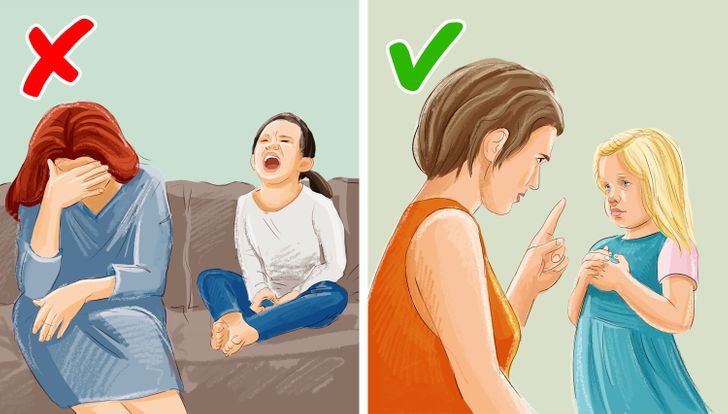
While your children should feel like they can turn to you for support whenever they need to, they should also understand that you’re more than their friend. You’re their parent, who has to make harsh decisions sometimes to take care of the health and the well-being of your child.
How this works: Your child should feel your authority and understand that your opinion outweighs theirs. But don’t act like a bad boss: screaming at your kid and trying to persuade them that you’re in charge just because you’re a parent won’t do the trick. Children have to feel your confidence and see you as a person they can look up to, so they’ll listen to you and won’t think they can get away with bad behavior.
Example: Your child throws a tantrum and refuses to leave the shop until you buy them a toy. Instead of screaming at them or playing into this manipulation, keep calm and act like you have the situation under control. Let the child express their emotions and then have a talk. Let the child feel that you can say “no” to their demands if they feel unreasonable and your word will be final.
10. Teach your child how to appreciate the good things in their life.

We want to give our children as much as we possibly can, but sometimes parents notice that children just don’t appreciate the things they have and always ask for more. Overconsumption and lack of appreciation can be serious problems that influence a child’s behavior. It’s essential to teach the child how to practice gratitude from an early age.
How this works: The gratitude technique depends on the age of the child. With toddlers, it’s better to start with teaching them good manners, like saying “thank you” and “please.” Parents also can try to switch the child’s attention from owning more things to getting more experiences and positive emotions. It’s essential to explain the value of money and why we prioritize some things over others.
Example: Instead of focusing on presents during the holidays, try to create happy memories for your children that aren’t connected to gifts. Skating, playing board games, or inviting friends over doesn’t encourage your child to consume more and shows them that they can be happy without spending money.
Have you tried any of these techniques to deal with your child when they’re acting out? Or do you know any other approach that can help? Share your experience in the comments.
Comments
I hate it when kids get everything from their partens from a young age, this makes them super spoiled and just unfriendly in general :/
thanks for these tips. #Bright side love from pakistan
I'm not so sure, if you let your kid get bad marks at school, most of the kids wont even care and keep not studying. It comes from the experience and things I saw at my school
Related Reads
20 Times Quiet Kindness Defeated the Dark Side of People
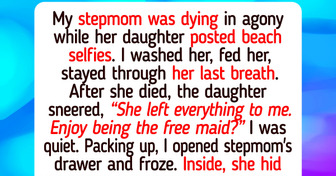
10 Moments of Superhuman Strength That Feel Like Winning the Olympic Games
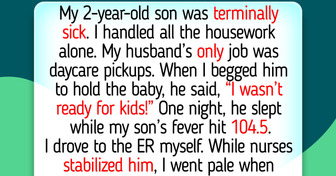
12 Life Moments Where Quiet Kindness Played the Main Role

I Refused to Put My Health at Risk Because of My Job, Now HR Got Involved

15 Stories That Prove Some Memories Are Impossible to Delete

My Neighbor Refused to Help My Autistic Son, She Wasn’t Ready for My Revenge
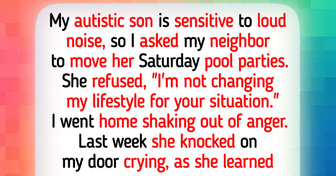
I Refuse to Reschedule My Husband’s Funeral—Even Though My Family Planned a Wedding

15 Times Someone Showed Kindness Without Saying Anything
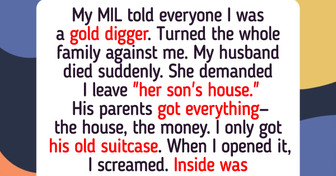
18 Stories Where Kindness Made It Human Again
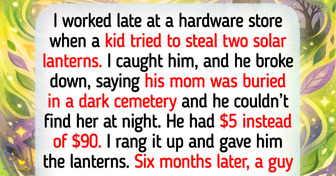
11 Stories That Only Worked Because of Kindness
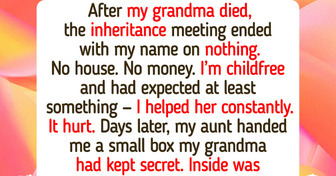
I Canceled My Sister’s Free Childcare—Her Cruel Words Cost Her My Support
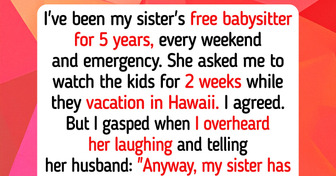
I Gave My MIL a Simple Gift—But My Family Demanded I “Choose a Side”
